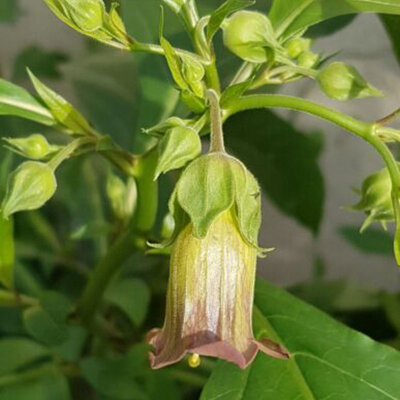
Atropa komarovii - Belladonna
This species, almost 2 m high, has small yellow flowers with purple veins, followed by black berries. It has a long history of medicinal, pharmaceutical, ritual, entheogenic and magical uses.
All parts of the plant can be highly toxic when misused, as they contain highly potent substances such as hyoscyamine, atropine, scopolamine and others.
in bucket
Perennial seeds require a wintering period for germination. Place them in the fridge for 60 days before sowing in spring. Sow in trays, on the surface, then press lightly. When the plants have 5 or 6 leaves, transplant into individual pots or directly into warmed soil. Autumn sowing is done in the same way and left outdoors until spring.
February, March, April, September, October, November
June, July, August
in the ground, in pot
semi-shade
medium
humus
fees
Atropa komarovii
mid-season
50 seeds
Violet, Yellow
From 100 to 200 cm
Turkmenistan
Atropa komarovii, the Turkmen Belladonna, grows in the same Central Asian zone as Atropa pallidiflora and Atropa cuminata. It is often associated with Mandrogora turkomanica and Ephedra equisetina. According to some botanists, it is possible that these are just subspecies within the Atropa belladona species - which is probably more of a specific complex. According to geneticists, the two species diversified some 13 million years ago. Botanists are also intrigued by the presence of Belladonna in Siberia, but given the multi-millennia of Uyghur and Ayurvedic medicine, it's not surprising that highly medicinal plants are deliberately disseminated by shamans and therapists. This is true of all Belladonna plants, which are important remedies in Eurasian medicine, but difficult to access due to some of their toxic components in high doses - including atropine, scopolamine and hyoscyamine. Belladonna was one of the most highly regarded traditional medicinal species among Europe's ancient apothecaries and pharmacists. Hildegarde de Bingen, for example, recommended it as an ointment for toothache. In Traditional Chinese Medicine, this medicinal species, known as Dian Qie, is used to soothe pain and spasms, and to relieve duodenal and gastric ulcers, nausea, vomiting, cholecystalsia, fevers, epilepsy and more. This species is also used by the pharmaceutical industry for the treatment of conjunctivitis, asthma, urinary tract infections, biliary imbalances, etc. The Atropa genus contains numerous components, flavonoids, alkaloids, terpenes, etc. Biological and pharmacological studies have shown that Atropa can be used to treat a wide range of conditions. Published biological and pharmacological studies have highlighted a broad spectrum of medicinal capacities for species of the Atropa genus - named after one of the Moires in Greek Mythology, Atropos, the Implacable - namely, anti-cancer, anti-tumor, anti-oxidant, antibacterial, antimicrobial, antiviral, etc. Belladonna species have also been much studied recently for their ability to treat neurodegenerative pathologies such as Parkinson's disease. Two medicinal plants in the Solanaceae family are being particularly studied for their neuronal regeneration capacities: Atropa belladonna and Hyoscyamus niger, as well as the following species: Belladonna can also act as an anti-poison in cases of morphine, pilocarpine and muscarine intoxication.






